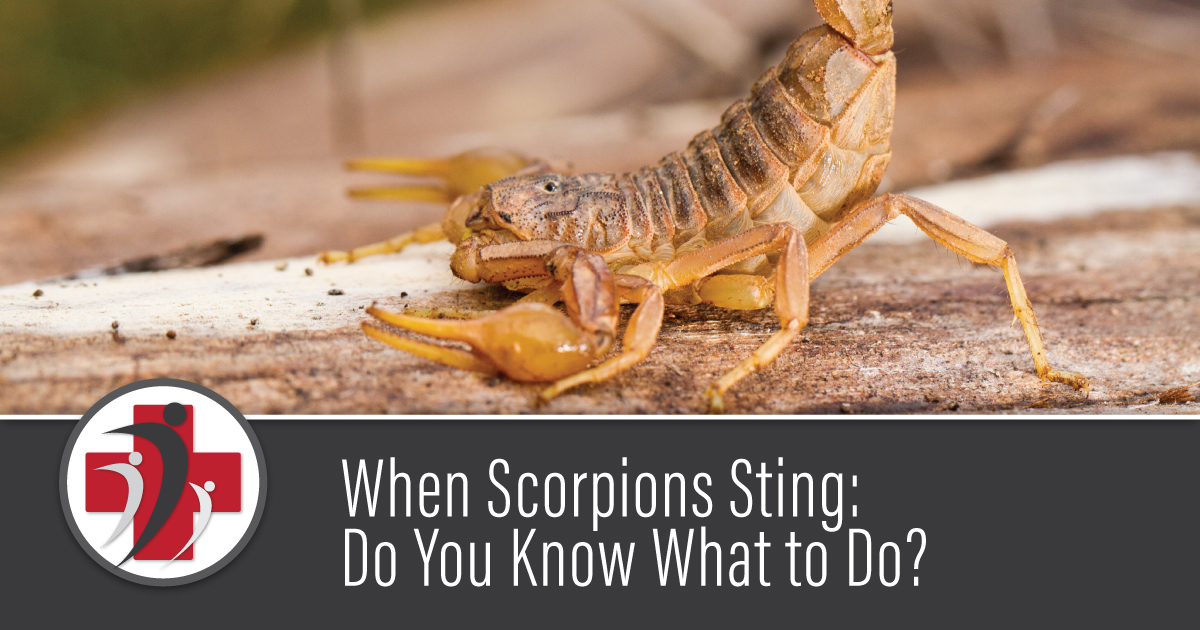When Scorpions Sting: Do You Know What to Do?

Dealing with scorpions is an unfortunate reality of living in Arizona, especially during the summer months. While scorpions are generally considered nonaggressive, they will often attack if disturbed or accidentally brushed or stepped on. This is especially concerning given that the scorpion that is known to be the most venomous in North America, the Arizona bark scorpion, is prevalent in Arizona.
The Arizona Poison and Drug Information Center report that there are about 2,500-3,000 scorpion stings reported per year, and there are likely many more scorpion encounters that are unreported. In fact, the University of Arizona Health Sciences reports that poison centers in Arizona receive upwards of 20,000 calls per year related to scorpion questions and issues. Because scorpion stings in El Mirage are so common, we want to offer an overview of what to do, or not do, in the case of an attack.
Because any Arizona scorpion sting is likely to come from the Arizona bark scorpion, you should seek emergency care right away if you receive a sting. The staff at the El Mirage Emergency Room will quickly assess what care is needed, and may administer antivenom.
It’s especially important that older adults, those with compromised immune systems, and young children seek urgent medical care after a scorpion sting, as they are more vulnerable and may require specialized care.
In the period of time before your emergency care can begin, here is the course of action recommended by the El Mirage Emergency Room:
- Wash the area with soap and water
- Apply a cold compress to help reduce pain and swelling
- You may take an over-the-counter pain reliever to manage pain, but you should NOT take allergy medications or use an EpiPen
- Keep the affected area still and elevate it to heart level if possible
- Capture the scorpion if it’s safe to do so, and bring it into the emergency room (this can help our team identify the species and treat accordingly).
While you should always seek emergency care after a scorpion sting in Arizona, there are some particularly concerning symptoms to watch for. Neurotoxic envenomation happens when the nervous system is poisoned and disrupted by venom.
Some symptoms of neurotoxic envenomation include difficulty breathing, experiencing double vision, fever, elevated heart rate, nausea, or excessive saliva. If you experience any of these symptoms after a scorpion sting, you should make every effort to some to the El Mirage Emergency Room as quickly as possible. Let the El Mirage medical team know about the symptoms you experience so we can treat you in the most efficient and effective way possible.
At the El Mirage Emergency Room, our team will treat scorpion stings quickly and safely. And, as always, we believe in “better safe than sorry” and have seen many lives saved using that motto. if you’re unsure whether the sting you incurred, or any other medical condition or injury, is serious enough to warrant emergency care, always err on the side of caution and come in. Our team is ready to help; today, tomorrow, and anytime you need us.
Related Posts

Resolution into Habit: How to make it stick.
As the New Year begins to settle in, many people have started to invest time…

New Year’s Resolutions
As the holiday season winds down and the post-Christmas haze begins to fade, a new…

Holiday Heart Syndrome: What You Need to Know
The holiday season is filled with celebrations, special meals, and moments of connection—but for some…
